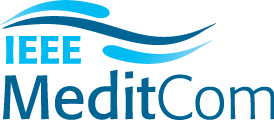Tuesday 6 September 2022, 14:00 – 15:30
P1. 6G Enablers for Extended Reality and the Metaverse
Organizer: Riccardo Trivisonno, Huawei Technologies Munich, Germany
Moderator: Nancy Alonistioti, University of Athens, Greece
Panelists:
- Riccardo Guerzoni, DOCOMO, Munich (Germany)
- Harilaos Kumaras, NCSR Demokritos (Greece)
- Qi Zhang, Aarhus University (Denmark)
- Toktam Mahmoodi, King’s College London (United Kingdom)
Abstract: Multimedia applications have been for long time among the key drivers for the evolution of mobile network technologies and architectures, as well as a pivotal business case. Coherently with past trends, recent developments in devices, software and applications for Virtual (VR), Augmented (AR), and Extended Reality (XR) services are attracting an increasing attention within the communication and networking research community. Such services have the potential to foster tremendous business opportunities in the coming decades in a number of fields, including next generation social media, gaming and entertainment industry, remote critical industrial operations, and remote healthcare, just to name a few. At the same time, the complexity of such services will be posing extreme communication, computation and energy consumption requirements, both to devices and telecommunication networks. Incidentally, this revived hype on services which were subject of science fiction movies a few decades ago, is running in parallel with the definition and development of 6G enabling technologies. It is hence expected that 6G will be shaped to allow the support of *-R services and to exploit the business potential behind them. Starting from requirements and challenges, the panel will develop discussing technologies and enablers which may lead to a sustainable and ubiquitous support of *-R services, and will debate on the necessary steps to make them essential components of next generation 6G systems.
Riccardo Guerzoni
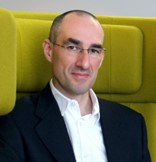 Riccardo Guerzoni holds an M.Sc. degree in Telecommunications Engineering from the Università degli Studi di Ferrara, Italy. Currently he is Director of the Core Network Group at DOCOMO Euro-Labs, Munich, Germany. He contributed to the standardization of the 3GPP 5G core network since Release 15, with special focus on support of Edge Computing and integration of Industrial IoT. Since June 2020, he is board member of the 5G Alliance for Connected Industries and Automation (5G-ACIA). Since 2021, he is board member of one 6G Association.
Riccardo Guerzoni holds an M.Sc. degree in Telecommunications Engineering from the Università degli Studi di Ferrara, Italy. Currently he is Director of the Core Network Group at DOCOMO Euro-Labs, Munich, Germany. He contributed to the standardization of the 3GPP 5G core network since Release 15, with special focus on support of Edge Computing and integration of Industrial IoT. Since June 2020, he is board member of the 5G Alliance for Connected Industries and Automation (5G-ACIA). Since 2021, he is board member of one 6G Association.
Harilaos Koumaras
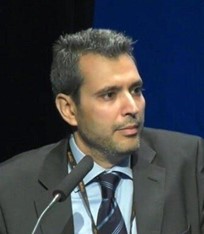 Dr. Harilaos Koumaras is a Research Assistant Professor at the Institute of Informatics and Telecommunications of NCSR “Demokritos”, Greece. He has published more than 100 articles focused on 5G/B5G systems, network virtualization, SDN/NFV, MANO, and quality of service/experience in media delivery. Harilaos is the technical manager of the H2020 5G-PPP EVOLVED-5G project and technical manager of Horizon Europe AerOS project.
Dr. Harilaos Koumaras is a Research Assistant Professor at the Institute of Informatics and Telecommunications of NCSR “Demokritos”, Greece. He has published more than 100 articles focused on 5G/B5G systems, network virtualization, SDN/NFV, MANO, and quality of service/experience in media delivery. Harilaos is the technical manager of the H2020 5G-PPP EVOLVED-5G project and technical manager of Horizon Europe AerOS project.
Qi Zhang
 Dr. Qi Zhang is an Associate Professor with the Department of Electrical and Computer Engineering, Aarhus University, Aarhus, Denmark. She received her M.Sc. and Ph.D. degrees in telecommunications from the Technical University of Denmark (DTU), Denmark, in 2005 and 2008, respectively. Her research interests include Internet of Things, Edge Computing, Tactile Internet, semantic communication, compressive sensing, as well as sensor data compression and analytics. She is PI of three prestigious Danish Independent Research Fund Projects: AgilE-IoT (Agile Edge Intelligence for Delay Sensitive IoT) and Light-IoT (Analytics Straight on Compressed IoT Data) and eTouch (Edge Intelligence for Immersive Telerobotics in Touch-enabled Tactile Internet). She is project coordinator and PI of Horizon Europe MSCA Doctoral Networks TOAST (Touch-enabled Tactile Internet Training Network and Open Source Testbed). She has more than 100 publications in high impact journals and flagship conferences such as IEEE Internet of Things Journal and IEEE INFOCOM. She is serving as an Editor for EURASIP Journal on Wireless Communications and Networking. Besides her academic experiences, she has various industrial experiences.
Dr. Qi Zhang is an Associate Professor with the Department of Electrical and Computer Engineering, Aarhus University, Aarhus, Denmark. She received her M.Sc. and Ph.D. degrees in telecommunications from the Technical University of Denmark (DTU), Denmark, in 2005 and 2008, respectively. Her research interests include Internet of Things, Edge Computing, Tactile Internet, semantic communication, compressive sensing, as well as sensor data compression and analytics. She is PI of three prestigious Danish Independent Research Fund Projects: AgilE-IoT (Agile Edge Intelligence for Delay Sensitive IoT) and Light-IoT (Analytics Straight on Compressed IoT Data) and eTouch (Edge Intelligence for Immersive Telerobotics in Touch-enabled Tactile Internet). She is project coordinator and PI of Horizon Europe MSCA Doctoral Networks TOAST (Touch-enabled Tactile Internet Training Network and Open Source Testbed). She has more than 100 publications in high impact journals and flagship conferences such as IEEE Internet of Things Journal and IEEE INFOCOM. She is serving as an Editor for EURASIP Journal on Wireless Communications and Networking. Besides her academic experiences, she has various industrial experiences.
Toktam Mahmoodi
 Toktam Mahmoodi [S’06, M’09, SM’16] is a Professor of Communication Engineering and Director of the Centre for Telecommunications Research (CTR) in King’s College London. Previously, she was visiting research scientist at F5 Networks, research associate in Imperial College London, Mobile VCE researcher, and telecom R&D engineer. Toktam is and has been involved in number of European FP7 and H2020 projects on 5G mobile networks, vehicular communications, and Software-Defined Networking. Her research focuses on the areas of mobile and cloud networking, and includes ultra-low latency networking, network virtualization, mobility management, network modelling and optimization. She has contributed to the ETSI, IETF and 3GPP standards, and has played an active role within 5GPPP in defining 5G vision for vertical industries. She has also served on a number of editorial boards, and in roles including Executive Editor of Transactions on Emerging Telecommunications Technologies, Series Guest Editor of JSAC Series on Network Softwarization, Area Editor of IEEE Communications Standard Magazine on Management & Orchestration, and Editor of IEEE communication Letters. Toktam served as General Chair of ICT 2021, and has been technical committee chair and member of various IEEE ComSoc conferences.
Toktam Mahmoodi [S’06, M’09, SM’16] is a Professor of Communication Engineering and Director of the Centre for Telecommunications Research (CTR) in King’s College London. Previously, she was visiting research scientist at F5 Networks, research associate in Imperial College London, Mobile VCE researcher, and telecom R&D engineer. Toktam is and has been involved in number of European FP7 and H2020 projects on 5G mobile networks, vehicular communications, and Software-Defined Networking. Her research focuses on the areas of mobile and cloud networking, and includes ultra-low latency networking, network virtualization, mobility management, network modelling and optimization. She has contributed to the ETSI, IETF and 3GPP standards, and has played an active role within 5GPPP in defining 5G vision for vertical industries. She has also served on a number of editorial boards, and in roles including Executive Editor of Transactions on Emerging Telecommunications Technologies, Series Guest Editor of JSAC Series on Network Softwarization, Area Editor of IEEE Communications Standard Magazine on Management & Orchestration, and Editor of IEEE communication Letters. Toktam served as General Chair of ICT 2021, and has been technical committee chair and member of various IEEE ComSoc conferences.
Wednesday 7 September 2022, 14:00 – 15:30
P2. Integrated Sensing and Communications for Industrial Applications
Organizer: Narcis Cardona, iTEAM Research Institute, Universitat Politecnica de Valencia, Spain
Moderator: Narcis Cardona, iTEAM UPV, Valencia, Spain
Panelists:
- Andrea Giorgietti, CNIT (Italy)
- Huseyin Arslan, Medipol University (Turkey)
- Panagiotis Demestichas, Wings/University of Piraeus, (Greece)
- Richard Stirling-Gallacher, Huawei (Germany)
Abstract: The next generation of networks (6G) is still in an early stage of definition, but some of its application scenarios and verticals start being focused, and some enabling technologies are already identified. Among those technologies, the joint sensing and communications (JSAC) techniques is globally accepted as one of the 6G pillars. JSAC has different approaches and levels of integration in the RF chain and a set of diverse implementation strategies in every scenario and frequency band. From evolved RF localization techniques to the integration of radar-like signals into the communications link, JSAC is expected to guarantee some crucial functionalities of the 6G, enriching the communications system with a precise knowledge of its environment. This panel brings together several experts in the field, with complementary views on the topic, and pretends to discuss to which extent JSAC will impact on the different verticals of application of the next generation of networks, with special emphasis on the industrial communications.
Andrea Giorgetti
 Andrea Giorgetti (Senior Member, IEEE) received the Dr. Ing. degree (summa cum laude) in electronic engineering and the Ph.D. degree in electronic engineering and computer science from the University of Bologna, Italy, in 1999 and 2003, respectively. From 2003 to 2005, he was a Researcher with the National Research Council, Italy. He joined the Department of Electrical, Electronic, and Information Engineering Guglielmo Marconi, University of Bologna, as an Assistant Professor, in 2006 and was promoted to an Associate Professor in 2014. In spring 2006, he was with the Laboratory for Information and Decision Systems (LIDS), Massachusetts Institute of Technology (MIT), Cambridge, MA, USA. Since then, he has been a frequent visitor to the Wireless Information and Network Sciences Laboratory, MIT, where he holds the Research Affiliate appointment. His research interests include ultrawide bandwidth communication systems, active and passive localization, wireless sensor networks, and cognitive radio. He has co-authored the book Cognitive Radio Techniques: Spectrum Sensing, Interference Mitigation, and Localization (Artech House, 2012). He was the Technical Program Co-Chair of several symposia at the IEEE International Conference on Communications (ICC) and the IEEE Global Communication Conference (Globecom). He has been an Editor of IEEE COMMUNICATIONS LETTERS and IEEE TRANSACTIONS ON WIRELESS COMMUNICATIONS. He has been elected Chair of the IEEE Communications Society’s Radio Communications Technical Committee from 2017 to 2018.
Andrea Giorgetti (Senior Member, IEEE) received the Dr. Ing. degree (summa cum laude) in electronic engineering and the Ph.D. degree in electronic engineering and computer science from the University of Bologna, Italy, in 1999 and 2003, respectively. From 2003 to 2005, he was a Researcher with the National Research Council, Italy. He joined the Department of Electrical, Electronic, and Information Engineering Guglielmo Marconi, University of Bologna, as an Assistant Professor, in 2006 and was promoted to an Associate Professor in 2014. In spring 2006, he was with the Laboratory for Information and Decision Systems (LIDS), Massachusetts Institute of Technology (MIT), Cambridge, MA, USA. Since then, he has been a frequent visitor to the Wireless Information and Network Sciences Laboratory, MIT, where he holds the Research Affiliate appointment. His research interests include ultrawide bandwidth communication systems, active and passive localization, wireless sensor networks, and cognitive radio. He has co-authored the book Cognitive Radio Techniques: Spectrum Sensing, Interference Mitigation, and Localization (Artech House, 2012). He was the Technical Program Co-Chair of several symposia at the IEEE International Conference on Communications (ICC) and the IEEE Global Communication Conference (Globecom). He has been an Editor of IEEE COMMUNICATIONS LETTERS and IEEE TRANSACTIONS ON WIRELESS COMMUNICATIONS. He has been elected Chair of the IEEE Communications Society’s Radio Communications Technical Committee from 2017 to 2018.
Huseyin Arslan
 Dr. Arslan (IEEE Fellow, IEEE Distinguished Lecturer, Member of Turkish Academy of Sciences) received his BS degree from the Middle East Technical University (METU), Ankara, Turkey in 1992; his MS and Ph.D. degrees were received respectively in 1994 and 1998 from Southern Methodist University (SMU), Dallas, TX. From January 1998 to August 2002, he was with the research group of Ericsson, where he was involved with several projects related to 2G and 3G wireless communication systems. Between August 2002 and 2022, Dr. Arslan was a Professor with the Electrical Engineering Department, at the University of South Florida. In December 2013, he joined Istanbul Medipol University to found the Engineering College, where he has been working as the Dean of the School of Engineering and Natural Sciences. In addition, he has worked as a part-time consultant for various companies and institutions including Anritsu Company and The Scientific and Technological Research Council of Turkey.
Dr. Arslan (IEEE Fellow, IEEE Distinguished Lecturer, Member of Turkish Academy of Sciences) received his BS degree from the Middle East Technical University (METU), Ankara, Turkey in 1992; his MS and Ph.D. degrees were received respectively in 1994 and 1998 from Southern Methodist University (SMU), Dallas, TX. From January 1998 to August 2002, he was with the research group of Ericsson, where he was involved with several projects related to 2G and 3G wireless communication systems. Between August 2002 and 2022, Dr. Arslan was a Professor with the Electrical Engineering Department, at the University of South Florida. In December 2013, he joined Istanbul Medipol University to found the Engineering College, where he has been working as the Dean of the School of Engineering and Natural Sciences. In addition, he has worked as a part-time consultant for various companies and institutions including Anritsu Company and The Scientific and Technological Research Council of Turkey.
Panagiotis Demestichas
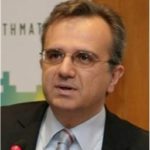 Panagiotis Demestichas is a Professor at the University of Piraeus, School of ICT, Department of Digital Systems, Greece. Currently, he focuses on the development of systems for WINGS ICT Solutions (www.wings-ict-solutions.eu), its spin-outs Incelligent (www.incelligent.net), and the joint venture diTTo (https://ditto-engineering.com/). WINGS focuses on advanced solutions, leveraging on IoT / 5G / AI / AR, for the environment (air quality), utilities and infrastructures (water, energy, gas, transportation, construction), production and manufacturing (aquaculture, agriculture and food safety, logistics and industry 4.0), service sectors (health, security). Incelligent focuses on products for banking, the public sector and for telecommunication infrastructures. Panagiotis conducts research on 6G, cloud and IoT, big data and artificial intelligence, orchestration / diagnostics and intent-oriented mechanisms. He holds a Diploma and a Ph.D. degree on Electrical Engineering from the National Technical University of Athens (NTUA). He holds patents, has published numerous articles and research papers, and is a member of the Association for Computing Machinery (ACM) and a Senior Member of IEEE.
Panagiotis Demestichas is a Professor at the University of Piraeus, School of ICT, Department of Digital Systems, Greece. Currently, he focuses on the development of systems for WINGS ICT Solutions (www.wings-ict-solutions.eu), its spin-outs Incelligent (www.incelligent.net), and the joint venture diTTo (https://ditto-engineering.com/). WINGS focuses on advanced solutions, leveraging on IoT / 5G / AI / AR, for the environment (air quality), utilities and infrastructures (water, energy, gas, transportation, construction), production and manufacturing (aquaculture, agriculture and food safety, logistics and industry 4.0), service sectors (health, security). Incelligent focuses on products for banking, the public sector and for telecommunication infrastructures. Panagiotis conducts research on 6G, cloud and IoT, big data and artificial intelligence, orchestration / diagnostics and intent-oriented mechanisms. He holds a Diploma and a Ph.D. degree on Electrical Engineering from the National Technical University of Athens (NTUA). He holds patents, has published numerous articles and research papers, and is a member of the Association for Computing Machinery (ACM) and a Senior Member of IEEE.
Richard A. Stirling-Gallacher
 Richard A. Stirling-Gallacher (Member, IEEE) received the M.Eng. degree in electronic engineering from the University of Southampton, U.K., in 1990, and the Ph.D. degree from The University of Edinburgh, U.K., in 1997. From 1997 to 2012, he was a Principal Researcher with Sony Deutschland GmbH, Stuttgart, Germany, where he led wireless system and algorithmic research for 3G, 4G, and millimeter-wave (mm-wave)-based communication systems. From 2012 to 2014, he was with Samsung Research America, Dallas, TX, USA, where he led research and pre-standardization for mm-wave and massive multi in multi out (MIMO) for 5G New Radio. He joined Huawei Technologies Inc., San Diego, CA, USA, in 2014, and subsequently in 2017, transferred to the Munich Research Center, Huawei Technologies Duesseldorf GmbH, Munich, Germany, as a Research Expert/Team Leader. He currently holds more than 110 granted U.S. patents. His current research interests include integrated communications and sensing, positioning, massive MIMO, and V2X for beyond 5G communication systems.
Richard A. Stirling-Gallacher (Member, IEEE) received the M.Eng. degree in electronic engineering from the University of Southampton, U.K., in 1990, and the Ph.D. degree from The University of Edinburgh, U.K., in 1997. From 1997 to 2012, he was a Principal Researcher with Sony Deutschland GmbH, Stuttgart, Germany, where he led wireless system and algorithmic research for 3G, 4G, and millimeter-wave (mm-wave)-based communication systems. From 2012 to 2014, he was with Samsung Research America, Dallas, TX, USA, where he led research and pre-standardization for mm-wave and massive multi in multi out (MIMO) for 5G New Radio. He joined Huawei Technologies Inc., San Diego, CA, USA, in 2014, and subsequently in 2017, transferred to the Munich Research Center, Huawei Technologies Duesseldorf GmbH, Munich, Germany, as a Research Expert/Team Leader. He currently holds more than 110 granted U.S. patents. His current research interests include integrated communications and sensing, positioning, massive MIMO, and V2X for beyond 5G communication systems.
Thursday 8 September 2022, 14:00 – 15:30
P3. Usage Scenarios and Technology Enablers for 6G
Organizer: Angeliki Alexiou, University of Piraeus Greece) and WWRF
Moderator: Angeliki Alexiou, University of Piraeus (Greece) and WWRF
Panelists:
- Harish Viswanathan, Nokia Bell Labs (USA)
- Carlos-Faouzi Bader, Technology Innovation Institute (UAE)
- Fotis Lazarakis, Research Director, NCSR “Demokritos”, Greece
- Panagiotis Kosmas, VP, Meta Materials Inc, Dartmouth, Nova Scotia (Canada)
Abstract: 6G networks are expected to deliver immersive, reconfigurable, intelligent, and interactive connectivity in a large dynamic range of usage scenarios, including isolated remote and rural areas, ultra-dense broadband-hungry hotspots, mixed reality, cyber-physical connectivity, and internet of senses scenarios, to name just a few.
The exploitation of higher frequency bands, the adoption of novel hardware technologies, intelligent materials, and innovative design / implementation concepts, such as holographic radio and semantic communications can help accelerate the realization of 6G visionary objectives and ambitious performance targets. Nevertheless, the careful selection of use cases and accurate specification of usage scenarios will determine the requirements and will play -more than ever before- a decisive role in the system concept and reference architecture to be adopted, for which modularity, energy efficiency, reconfigurability, and intelligence will be necessary inherent features.
This panel discussion will try to shed some light on these challenges, especially under the prism of the significance of jointly address /optimize usage scenarios and technology enablers for 6G.
Harish Viswanathan
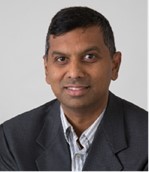 Dr. Harish Viswanathan is Head of Radio Systems Research Group in Nokia Bell Labs. He received the B. Tech. degree from the Department of Electrical Engineering, Indian Institute of Technology, Chennai, India and the M.S. and Ph.D. degrees from the School of Electrical Engineering, Cornell University, Ithaca, NY. Since joining Bell Labs, he has worked extensively on wireless research ranging from physical layer to network architecture and protocols including multiple antenna technology for cellular wireless networks, multi-hop relays, network optimization, network architecture, and IoT communications. He has published extensively with over 100 publications. From 2007 to 2015, Harish was in the Corp CTO organization, where as a CTO Partner he advised the Corporate CTO on Technology Strategy through in-depth analysis of emerging technology and market needs. He is a Fellow of the IEEE and a Bell Labs Fellow.
Dr. Harish Viswanathan is Head of Radio Systems Research Group in Nokia Bell Labs. He received the B. Tech. degree from the Department of Electrical Engineering, Indian Institute of Technology, Chennai, India and the M.S. and Ph.D. degrees from the School of Electrical Engineering, Cornell University, Ithaca, NY. Since joining Bell Labs, he has worked extensively on wireless research ranging from physical layer to network architecture and protocols including multiple antenna technology for cellular wireless networks, multi-hop relays, network optimization, network architecture, and IoT communications. He has published extensively with over 100 publications. From 2007 to 2015, Harish was in the Corp CTO organization, where as a CTO Partner he advised the Corporate CTO on Technology Strategy through in-depth analysis of emerging technology and market needs. He is a Fellow of the IEEE and a Bell Labs Fellow.
Carlos-Faouzi Bader
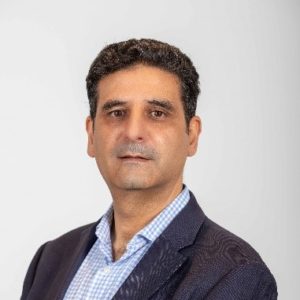 C. Faouzi Bader received his PhD degree (with Honours) in Telecommunications in 2001 from Universidad Politécnica de Madrid (UPM), Madrid-Spain. He joined the Centre Technologic de Telecomunicacions de Catalunya (CTTC) in Barcelona-Spain as research associate in 2002, and from 2006- to 2013 as Senior Research Associate. From June 2013 to end December, he has been as Associate Professor at CentraleSupélec (France). Since 2017, he is as Honorary Adjunct Professor at University of Technology Sydney (Australia), and during 2018-2019 the Head of Signals & Communications department at Institute of Electronics and Digital Technologies (IETR) in Rennes-France. From 2020 to end 2021, he took the position of the Director of research at Institut Supérieur D’Electronique de Paris-ISEP (France). From end of December 2021, he is Director of the Digital Telecom unit at the Digital Science Research Center (DSRC) of Technology Innovation Institute (TII) in Abu Dhabi-UAE. His research activities mainly focus on IMT-advanced systems as: 5G networks and systems, Cognitive Radio communication environment, and THz wireless communications (6G). He has been involved in several European projects from the 5th-7th EC research frameworks (8 EU funded projects and 10 national projects), from 2012 to 2013 he has been the general coordinator and manager of the EC funded ICT “EMPhAtiC” project focusing on “Enhanced Multicarrier Techniques for Professional Ad-Hoc and Cell-Based Communications”. From 2007-2021. Prof. F. Bader has been the main coordinator of the BRAVE ANR French project at CentraleSupélec (France) where the main goal was the achievement of efficient waveform for THz/Terabits wireless communication devices. He has published over 45 journals, 136 papers in peer-reviewed international conferences, more than 13 book chapters, and 4 edited books. He served as Technical Program Committee member in major IEEE ComSoc and VTS conferences (ICC, PIMRC, VTC spring/fall, WCNC, ISWCS, GLOBECOM, ICT). He is IEEE Senior Member since 2007.
C. Faouzi Bader received his PhD degree (with Honours) in Telecommunications in 2001 from Universidad Politécnica de Madrid (UPM), Madrid-Spain. He joined the Centre Technologic de Telecomunicacions de Catalunya (CTTC) in Barcelona-Spain as research associate in 2002, and from 2006- to 2013 as Senior Research Associate. From June 2013 to end December, he has been as Associate Professor at CentraleSupélec (France). Since 2017, he is as Honorary Adjunct Professor at University of Technology Sydney (Australia), and during 2018-2019 the Head of Signals & Communications department at Institute of Electronics and Digital Technologies (IETR) in Rennes-France. From 2020 to end 2021, he took the position of the Director of research at Institut Supérieur D’Electronique de Paris-ISEP (France). From end of December 2021, he is Director of the Digital Telecom unit at the Digital Science Research Center (DSRC) of Technology Innovation Institute (TII) in Abu Dhabi-UAE. His research activities mainly focus on IMT-advanced systems as: 5G networks and systems, Cognitive Radio communication environment, and THz wireless communications (6G). He has been involved in several European projects from the 5th-7th EC research frameworks (8 EU funded projects and 10 national projects), from 2012 to 2013 he has been the general coordinator and manager of the EC funded ICT “EMPhAtiC” project focusing on “Enhanced Multicarrier Techniques for Professional Ad-Hoc and Cell-Based Communications”. From 2007-2021. Prof. F. Bader has been the main coordinator of the BRAVE ANR French project at CentraleSupélec (France) where the main goal was the achievement of efficient waveform for THz/Terabits wireless communication devices. He has published over 45 journals, 136 papers in peer-reviewed international conferences, more than 13 book chapters, and 4 edited books. He served as Technical Program Committee member in major IEEE ComSoc and VTS conferences (ICC, PIMRC, VTC spring/fall, WCNC, ISWCS, GLOBECOM, ICT). He is IEEE Senior Member since 2007.
Fotis Lazarakis
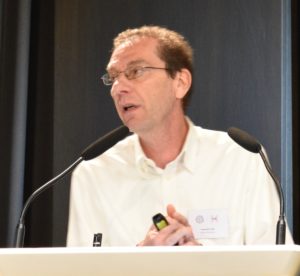 Fotis Lazarakis is Research Director at the Wireless Communications Laboratory of the Institute of Informatics and Telecommunications, National Center for Scientific Research “Demokritos”, Greece. He has been involved in a number of national and international projects, acting as a Project Manager to several of those. His current research interests include 5G and beyond, as well as 6G radio technologies and Reconfigurable Intelligent Surfaces. Recently, as member of the IMT-2020 5G IA Evaluation Group, he contributed to the evaluation of the first 5G candidate Radio Interface Technologies (RITs) submitted by standardization organizations. Among other activities, currently he is Work Package leader in H2020 project ARIADNE and research supervisor of an Early Stage Researcher in H2020 Marie Curie ITN META WIRELESS. Dr. Lazarakis has authored or co-authored 120 journal and conference papers and he is co-owner of a patent.
Fotis Lazarakis is Research Director at the Wireless Communications Laboratory of the Institute of Informatics and Telecommunications, National Center for Scientific Research “Demokritos”, Greece. He has been involved in a number of national and international projects, acting as a Project Manager to several of those. His current research interests include 5G and beyond, as well as 6G radio technologies and Reconfigurable Intelligent Surfaces. Recently, as member of the IMT-2020 5G IA Evaluation Group, he contributed to the evaluation of the first 5G candidate Radio Interface Technologies (RITs) submitted by standardization organizations. Among other activities, currently he is Work Package leader in H2020 project ARIADNE and research supervisor of an Early Stage Researcher in H2020 Marie Curie ITN META WIRELESS. Dr. Lazarakis has authored or co-authored 120 journal and conference papers and he is co-owner of a patent.
Panagiotis Kosmas
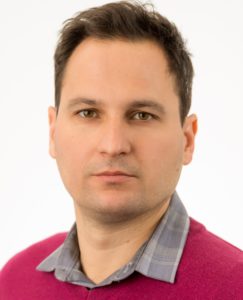 Panagiotis Kosmas is Vice President, Biomedical Engineering at Meta Materials Inc. (“META®”, (NASDAQ: MMAT), a NASDAQ-listed company specializing in various applications of metamaterials including 5G/6G telecommunications and healthcare. He is also the Director of Meta Materials Europe SA, an Athens-based subsidiary of META. He is a Co-Founder of Mediwise Ltd, an award-winning UK-based SME focusing on the use of electromagnetic waves for medical applications, which is now a subsidiary of META. Dr. Kosmas received his PhD in Electrical and Computer Engineering from Northeastern University, Boston, MA, USA, in 2005. He joined King’s College London (KCL), UK as a Lecturer in 2008, as a Reader in KCL’s Department of Engineering in 2017, and currently as a (part-time) Senior Research Fellow in the same department. He has held research positions at the Center for Subsurface Sensing and Imaging Systems (CenSSIS), Boston, USA; the University of Loughborough, UK; and the Computational Electromagnetics Group, University of Wisconsin-Madison, USA. His research interests include microwave engineering with application to medical sensing and imaging, antenna and sensor design, machine learning in biomedical applications, and inverse problems theory and techniques.
Panagiotis Kosmas is Vice President, Biomedical Engineering at Meta Materials Inc. (“META®”, (NASDAQ: MMAT), a NASDAQ-listed company specializing in various applications of metamaterials including 5G/6G telecommunications and healthcare. He is also the Director of Meta Materials Europe SA, an Athens-based subsidiary of META. He is a Co-Founder of Mediwise Ltd, an award-winning UK-based SME focusing on the use of electromagnetic waves for medical applications, which is now a subsidiary of META. Dr. Kosmas received his PhD in Electrical and Computer Engineering from Northeastern University, Boston, MA, USA, in 2005. He joined King’s College London (KCL), UK as a Lecturer in 2008, as a Reader in KCL’s Department of Engineering in 2017, and currently as a (part-time) Senior Research Fellow in the same department. He has held research positions at the Center for Subsurface Sensing and Imaging Systems (CenSSIS), Boston, USA; the University of Loughborough, UK; and the Computational Electromagnetics Group, University of Wisconsin-Madison, USA. His research interests include microwave engineering with application to medical sensing and imaging, antenna and sensor design, machine learning in biomedical applications, and inverse problems theory and techniques.
He has contributed over 150 journal and conference publications in these areas, and he has organized special sessions and delivered short courses and keynote presentations in major international conferences. He has also taught undergraduate and graduate courses on EM theory, antennas and propagation, electronics, and stochastic processes. From 2013-2017, Dr. Kosmas served as an elected Working Group Leader for the MiMed EU COST action (TD1301) on microwave imaging, and he is currently a member of the MyWAVE EU COST action (CA17115) on electromagnetic hyperthermia. He is currently an Associate Editor for IEEE Open Journal of Antennas and Propagation, Medical Physics, and Diagnostics.
